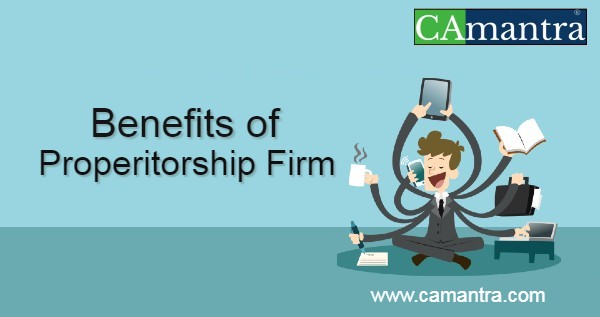Sole Proprietorship, you can say is a one-man business organization. Furthermore, a sole proprietor is a person (not a legal person/entity) who have their ownership and manages this type of entity. In Proprietorship Firm, the owner and the entity are same and does not have a separate legal entity. Additionally, a sole proprietorship usually does not get incorporated or registered. So, it is the easiest form of business form and the best choice to run a small / medium scale business
The sole proprietorship is also known as oldest and most common form of business entity owned by a single individual. The owner and the business are same for tax and legal liability purpose.
What are the benefits of Proprietorship Firm?
Easier Form of Business
Proprietorship Firm is the most common and easiest form of business, they usually do not get incorporated or registered.
Easy to Start
Any person can start his/her business easily as sole Proprietorships do not require essential registrations under any law. They only need registrations specific to the kind of business. The name of the company does not require any approval from registry.
Lesser Investment
Sole Proprietorships can be started with small amount of investment at the initial stage. So, it is a better opportunity for those who want to set up a business with low budget.
No Profit Sharing
In a sole Proprietor, the company is the only person who operates and manages the entire business, so 100% of the profits will leads to him/her. There is no need of sharing of profits to others.
Lesser Legal Compliances
Because Sole Proprietorships are not governed by any specific law, so the legal compliances are lesser.
Lesser income tax
Sole Proprietorship having only a Sole proprietor, so no separate tax is needed to be paid by it. Sole proprietor and the Sole Proprietorship counted as same for the purpose of calculation of tax liability. The assets & liabilities of this kind of business are the assets and liabilities of the Sole Proprietor.
Sole proprietor is required to file their normal tax return and show the profits earned in the business in that return itself. There is no need of separate return, the tax is calculated at income tax slab rates applicable to an individual. Other tax liabilities such as GST will depend upon the type of business.
Information is Private
In Limited Liability Partnerships financial statements and audit reports are made public for the users via Ministry of Corporate Affairs portal. In Sole Proprietorships the financial reports remain in private hands.
Take Self decision
As described above the Sole Proprietorship is managed & operated by single hand so there is no chance of ideas and decisions conflict. Sole Proprietors has the full right to do whatever he/she thinks will correct for the business.
No specific Requirement for audit
There is no need to get sole Proprietorship’s accounts audited each financial year under any specific law. In some cases, the audit will depend upon the nature of business and the threshold turnover limits specified for the conduct of the audit.
For example, a tax audit is required if the turnover of the company exceed INR 1 crore and for professional services, the audit is needed if receipts exceed INR 50 lacs. Similarly, GST audit is required if the turnover of company exceeds INR 2 crores.
Economical & Efficient Operations
The sole proprietor can keep together his sources to the best use. He/she can take steps to eliminate wastage of all kinds. He/she can control the cost of running the business. He/she can get the maximum benefit out of every piece of operation.

